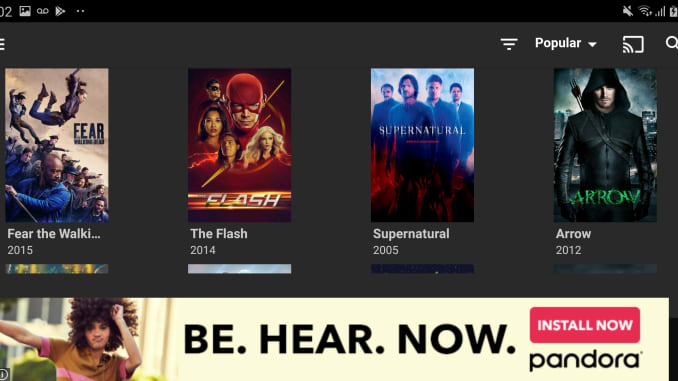Watching a bootleg version of “Joker” — albeit one that was obviously recorded from the back of a movie theater — is as easy as downloading an app from a website, finding the movie and clicking the play button.
There is one catch. Even though the content appears to be pirated, you’ll still have to sit through ads.
Among the more popular places to find this sort of unauthorized content is a site called TeaTV.
The online service offers a wide swath of pirated movies from major networks such as HBO and streaming services including Netflix as well as current releases from top movie studios.
Video ads have shown up from brands including TikTok, streaming service BET+, the Madden Mobile video game, music streaming service Pandora, Pluto TV, Hulu, Yahoo Mail and many more.
Ads also were appearing for major advertisers including Walgreens, Amazon’s Fire TV and Kia on the website through Google, The Trade Desk, Adroll and more but had stopped as of early October after CNBC began reaching out to advertisers and ad-tech companies.
Most brand advertisers contacted by CNBC did not respond to requests for comment or did not comment on the record. A Walgreens spokesperson said the company wasn’t aware of the issue and prohibits ads on sites with pirated content. The company added it was working to understand and resolve the matter.

The homepage of TeaTV’s Android app.Megan Graham
Consumers are given the option of downloading the app to Android, Windows or MacOS, where they can watch “free 1080p movies.”
And even though many companies in the advertising space know it’s an issue, the ads keep coming, on the app at least. At a recent meeting of major industry players in New York on the subject of ad-supported pirated content, TeaTV was one topic of conversation, according to a person in attendance.
Good luck trying to find who’s behind the service. On TeaTV’s website, there’s no detail about where the company is located, or if it’s even a company at all.
There’s no location or phone number provided, no individual’s name included and the only contact information is a Gmail address. (CNBC reached out and didn’t get a response.) The company does maintain an active Twitter profile, where it shares new releases and helps troubleshoot problems.
TeaTV isn’t alone. Apps and websites providing pirated content proliferate at a pace that experts say make the problem difficult to manage. Those trying to take down the sites find themselves in a game of “whack-a-mole.” Meanwhile, the digital content supply chain is so complex that it can be a challenge to keep track of where and why the ads are surfacing.
In the rapidly expanding and hypercompetitive world of content streaming, the industry is getting hammered by fraud. CreativeFuture, an advocacy organization that aims to combat content theft and protect intellectual property, citing a U.S. Chamber of Commerce figure says USD$29.2 billion is lost in the U.S. economy each year to global online piracy.
That’s a huge chunk of change considering the total digital ad spending market worldwide is expected to reach USD$333.3 billion this year, according to eMarketer.
Cesar Fishman, a senior vice president at CreativeFuture, said the scammy sites pull in ads from legitimate brands both to generate revenue and to make their service appear legitimate.
“All you need is a server in some undisclosed location where you store all this stuff, and you mask your IP address so you don’t get taken down,” said Fishman. “Your overhead is peanuts.”
There’s plenty of finger-pointing going on. Some in the industry argue that ad-tech players aren’t scrupulous enough about where ads can be placed, and others suggest that brands need to more clearly lay out which sites are acceptable and unacceptable for showing their ads. And some say the entire digital advertising ecosystem in its sprawling state makes it nearly impossible to expect safety.

Augustine Fou, an independent ad fraud researcher and consultant, said despite the industry’s supposed concern about having ads show up next to pirated and other content, the problem has just intensified.
“It is clear that despite industry trade bodies’ talk at conferences and brand safety tech that advertisers have paid for for years, the problem of ads supporting piracy, porn, child abuse and hate has only gotten worse,” he said. “And more dollars are at stake than ever before because digital ad dollars are at their highest point ever.”
Asked why the advertising could still be so pervasive even after the TeaTV issue was brought up at that meeting in New York, Mike Zaneis, CEO of the Trustworthy Accountability Group, or TAG, said the industry is making substantial progress but that piracy is a problem that will never be completely fixed. TAG says it works to eliminate fraud, malware and piracy in advertising but has also been the recent subject of criticism for its strategies to combat issues like this.
“We’re not perfect,” Zaneis told CNBC. “We’re never going to be perfect. We just want to solve as much of the problem as we can.”
The supply chain
One tool that’s supposed to help make the supply chain more transparent is a file called “ads.txt,” which was created by the IAB Tech Lab, a nonprofit research and development consortium. It gives publishers and distributors working in the programmatic ad universe a way to declare who is authorized to sell their inventory.
This tool wasn’t built to prevent piracy specifically but to help combat issues such as the sale of counterfeit inventory, where someone pretends to be selling inventory on a site and is actually putting it somewhere else, like a porn site or other scammy location. But it does give some clues about who could be monetizing TeaTV.
source:http://www.cnbc.com
MARKETING Magazine is not responsible for the content of external sites.










